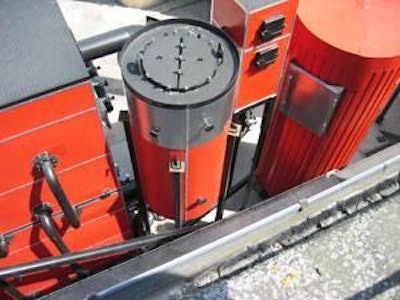
Every day, the world's egg companies process an estimated one million eggs. In the process to produce liquid and powdered egg products, these companies also generate huge volumes of wastes. In this environment-conscious world, disposal of eggshells and paper egg trays represents a significant cost and in many countries, legislation requires eggshells to be heat-treated so that they do not become a source of disease to humans or animals.
A 'green' solution
Danish engineering company, Sanovo Environmental Solutions, has developed a new way to deal with these wastes in an environmentally friendly and safe way.
Eggshells and trays are processed together, the trays forming the fuel to burn the shells. Rather than worthless ash from heating at low temperatures, the resulting residue from incineration is burnt limestone (also known as quicklime), a chemical with many industrial uses, including the building industry. The process turns waste products into a valuable material, while the process energy is exploited in the production.
Firstly, the egg trays are shredded so that they can be moved pneumatically into temporary storage. Trays and shells are incinerated together at a temperature of around 1000°C. This takes place under controlled conditions in a boiler system. The burning process generates heat, which can be used for any number of purposes, including the production of steam, which could be returned to the egg processing plant, or into hot water for the local district.
Because the eggshells and cardboard are uniform products and the process is controlled, the burnt limestone end-product is consistent. The high level of purity gives it an advantage over other, more variable sources of the chemical. Indeed, a Danish company producing burnt limestone by conventional methods is purchasing the new product as part of its environment-conscious policy. Alternative sources, often by mining, also adversely affect the environment.
First of its kind
The first incineration plant was built at Sanovo Foods in Odense, Denmark, and it was officially inaugurated in June this year.
Managing Director of the client company, Henrik Pedersen, commented, "Before we had this equipment, our company spent a huge amount of money every month on waste disposal costs. Now we are able to dispose of the eggshells and egg trays for free and on top of this, the process even creates valuable energy, which minimises the need for fossil fuels at our factory in Denmark."
The company says that the plant costs around 1.5 million not an insignificant investment. However, in these times of high energy costs, they estimate the savings to be in the region of 400,000 per year, giving a pay-back period of just 4 years.
equipment, our company spent a huge amount of money every month on waste disposal costs. Now we are able to dispose of the eggshells and egg trays for free and on top of this, the process even creates valuable energy, which minimises the need for fossil fuels at our factory in Denmark."
The company says that the plant costs around 1.5 million not an insignificant investment. However, in these times of high energy costs, they estimate the savings to be in the region of 400,000 per year, giving a pay-back period of just 4 years.

















